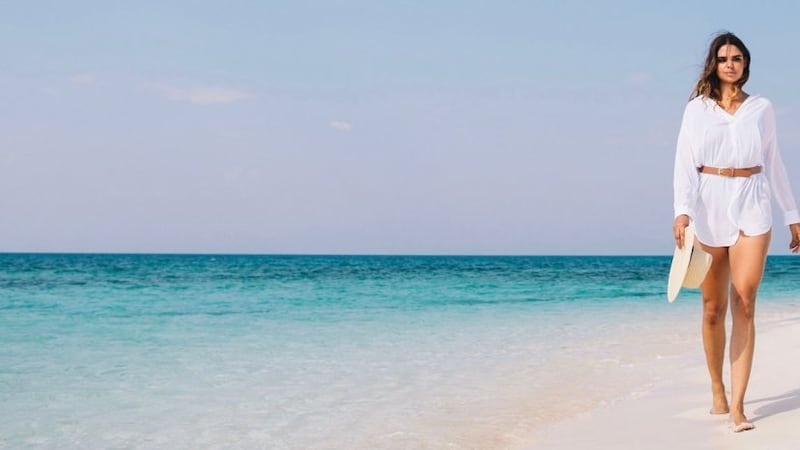Indigenous Australian model Samantha Harris is fronting Tropical North Queensland's tourism campaign. (Photo/Supplied)
Aboriginal supermodel Samantha Harris is encouraging Māori to connect with her people and experience the richness of her culture.
The model has broken fresh ground for indigenous women as the new face of Tropical North Queensland, making her the first indigenous Australian to front a mainstream tourism campaign for almost 20 years.
Harris is only the second aboriginal woman to make the cover of Australian Vogue, after model Elaine George. (Credit: Lita Magazine/Vogue Australia)
The 28-year-old, who is only the second aboriginal woman to feature on the cover of Australian Vogue, is the fresh face of a campaign to entice high-value Kiwi and Aussie travellers to holiday in the stunning region.
Harris who visited Daintree Rainforest with an aboriginal guide says the area is a deeply spiritual place Māori would appreciate. (Photo/Supplied)
It's an area Harris says Māori would especially appreciate as, besides the beautiful scenery, places like Daintree Rainforest are deeply spiritual.
"It's very cultural and very traditional," she says. "You can feel the heritage and the specialness of it."
Harris and her mother. (Source: Instagram.)
The Sydney-based model, whose mother is one of the stolen generations, was chosen to front the 'Feel Grounded' campaign because of the appeal of her indigenous heritage and prominent profile among Australia's metropolitan cities of Sydney and Melbourne.
WATCH Harris walk for upmarket retail store David Jones at the L'Oreal Melbourne Fashion Festival 2013. (Credit: David Jones Store/YouTube)
While Harris, from the Dunghutti people of northern New South Wales, has had major modelling assignments at Australian Fashion Week and, alongside Māori model Megan Gale, for upmarket retail store David Jones, the significance of promoting her country is not lost on the proudly aboriginal woman.
Harris told Te Ao it's special to be an indigenous woman promoting Australia.
"To be an indigenous woman promoting Australia I think it makes it that extra bit special,” she says.
Harris says it is amazing to be showcasing her country, especially as it would have been unimaginable once.
"Fifty years ago the thought of an aboriginal person to be promoting Australia in itself- back in the day people would have just kind of laughed or just thought it was something that would never happen."
It's a sign of the changing times in Australia. However, Harris says there is still much to be done to ensure aboriginal people are given the respect they deserve.
"[It's] a special culture and again one of the oldest cultures in the world and yet we were the first people here so why aren’t we recognised a lot more?"
Harris encourages Māori to consider travelling to some of the more remote areas of Australia to truly experience indigenous culture.
“It’s all well and good coming to main cities in Australia," she says, "but I feel like going out to remote areas like Uluru [Ayers Rock] and Alice Springs ... also Pilbara [in Western Australia] where there are a lot of indigenous people.
"They’re not like city slickers, they live quite traditional, quite cultural and I think that’s really special," she says.
The young woman who inspires hundreds of indigenous children says she was incredibly shy when she started out as a model at age 13 and sometimes a bit lonely.
"There wasn’t any other aboriginal models. It was kind of hard to find other races in runway shows," she says.
"There would literally be me, an Indian girl and an Asian girl ... that was like 'the culture.'"
These experiences have made Harris the person she is today and given her the confidence to speak up for her people and also call out racism.
She says she feels a responsibility to indigenous children to be a voice for them so they can have a better future.
"There are a lot of indigenous kids out there in the country. Is it being said to them? They don’t have a voice, unfortunately."
Harris says indigenous children deserve better than to have to put up with racist nonsense.
"It’s wrong, it shouldn’t be happening ... and the future generation shouldn’t have to put up with things like that," she says.
Harris says she loves being a role model for indigenous children. (Source: ideasforgood/YouTube)
It's clear indigenous children are dear to Harris' heart and she says she cherishes helping lift their spirits.
“I love being a role model for indigenous kids," she says.
Harris says she's especially touched by visits with children in remote communities.
"Meeting these kids, it's kind of like giving them hope that there is more out there.
"They don’t necessarily have to be a model or anything like that but just to follow their dreams," she says.
If Harris has one heartfelt plea, it's that her culture will be cherished and won't be allowed to disappear or be forgotten.
"I’m not sure about the Māori culture but I assume it would be similar," she says. "The aboriginal culture I feel like it’s neglected in some kind of way.
"For such a special culture, I feel like people kind of forget about it and as years go on our history is kind of dying in that aspect which I think is quite sad. So, I think the best kind of way is to kind of keep the culture alive."
Asked what Māori can do to help support her people she says, "We’re both very old races and I just think being there for support - moral support, emotional support."

